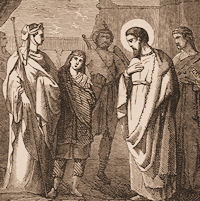Ordinary Time: October 27th
Tuesday of the Thirtieth Week of Ordinary Time
Old Calendar: St. Frumentius (Hist)
Called “Abuna” or “the father” of Ethiopia, St. Frumentius was sent to that land by St. Athanasius. Frumentius was born in Tyre, Lebanon. While on a voyage in the Red Sea with St. Aedesius, possibly his brother, only Frumentius and Aedesius survived the shipwreck. Taken to the Ethiopian royal court at Aksum, they soon attained high positions. Aedesius was royal cup bearer, and Fruementius was a secretary. They introduced Christianity to that land. When Abreha and Asbeha inherited the Ethiopian throne from their father, Frumentius went to Alexandria, Egypt, to ask St. Athanasius to send a missionary to Ethiopia. He was consecrated a bishop and converted many more upon his return to Aksum. Frumentius and Aedesius are considered the apostles of Ethiopia. Historically today is his feast.
Excerpted from Uncovered for Christ
St. Frumentius
Edesius and Frumentius, brothers from Tyre, Phoenician, introduced Christianity into Abyssinia; the latter a saint and first Bishop of Axum is styled the Apostle of Abyssinia, d. about 383.
When still mere boys they accompanied their uncle Metropius on a voyage to Abyssinia. When their ship stopped at one of the harbor of the Red Sea, people of the neighborhood massacred the whole crew, with the exception of Edesius and Frumentius, who were taken as slaves to the King of Axum. This occurred about 316. The two boys soon gained the favor of the king, who raised them to positions of trust and shortly before his death gave them their liberty.
The widowed queen, however, prevailed upon them to remain at the court and assist her in the education of the young prince Erazanes and in the administration of the kingdom during the prince's minority. They remained and (especially Frumentius) used their influence to spread Christianity. First they encouraged the Christian merchants, who were temporarily in the country, to practice their faith openly by meeting at places of public worship; later they also converted some of the natives.
When the prince came of age, Edesius returned to his friends and relatives at Tyre and was ordained priest, but did not return to Abyssinia. Frumentius, on the other hand, who was eager for the conversion of Abyssinia, accompanied Edesius as far as Alexandria, where he requested St. Athanasius to send a bishop and some priests to Abyssinia. St. Athanasius considered Frumentius himself the most suitable person for bishop and consecrated him in 328, according to others between 340-46.
Frumentius returned to Abyssinia, erected his episcopal see at Axum, baptized King Aeizanas, who had meanwhile succeeded to the throne, built many churches, and spread the Christian Faith throughout Abyssinia. The people called him Abuna (Our Father) or Abba Salama (Father of Peace), titles still given to the head of the Abyssinian Church.
In 365 Emperor Constantius addressed a letter to King Aeizanas and his brother Saizanas in which he vainly requested them to substitute the Arian bishop Theophilus for Frumentius (Athanasius, "Apol. ad Constantium" in P.G., XXV, 631).
The Latins celebrate the feast of Frumentius on 27 October, the Greeks on 30 November, and the Copts on 18 December.
Abyssinian tradition credits him with the first Ethiopian translation of the New Testament.
Excerpted from the Catholic Encyclopedia
